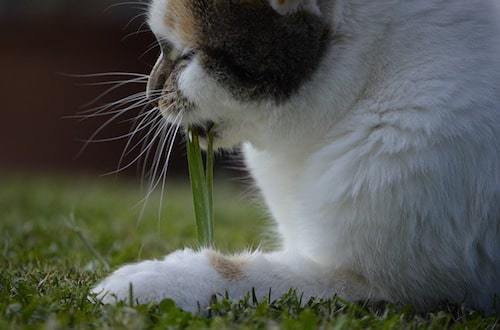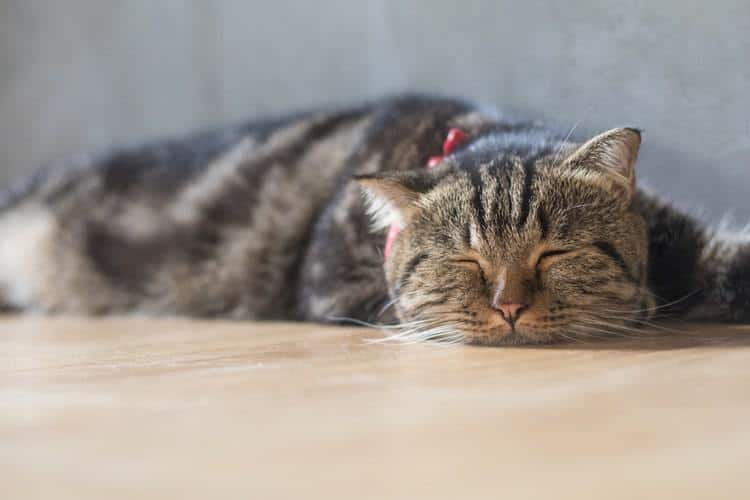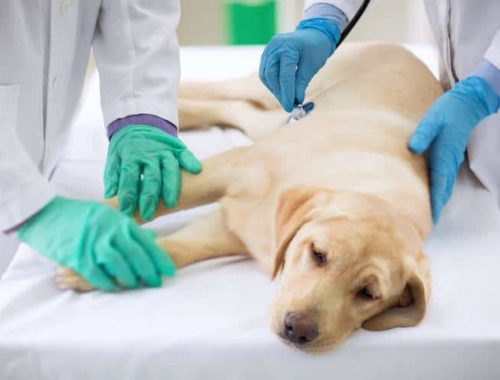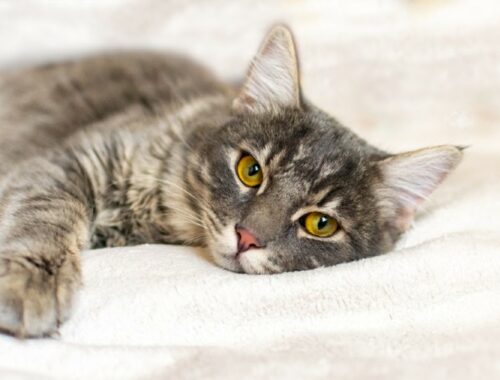Why does my cat have diarrhea?
Surprise! Your kitty left you a slimy, stinky mess to clean up at 3 a.m. But why?
Let’s talk about a few of the more common causes of diarrhea in cats. I’ll also discuss some safe home remedies you can try for mild cases.
Types of Diarrhea in Cats
The two main types of diarrhea in cats are:
Small Intestinal Diarrhea
- Normal Frequency
- Increased Quantity
- No Straining
- Weight Loss
Large Intestinal Diarrhea
- Increased Frequency
- Straining to Poop
- Mucus/Blood in Stool
- No Weight Loss
8 Causes of Liquid and Soft Stool
Technically, the cause of diarrhea in cats is increased water content in the stool. There are many things that lead to increased water content from innocent causes to deadly ones.
1. GI Parasites
Parasites are a major cause of diarrhea in cats. If your cat goes outdoors or is newly adopted, have your vet run a fecal test for parasites. Not all dewormers are effective for all parasites, so have your vet make a recommendation based on testing.
2. Dietary Indiscretion (Eating Gross Stuff)
Eating spoiled food might cause diarrhea within 24 hours. Cats who eat indigestible things can also develop an intestinal obstruction. If you suspect your cat ate something indigestible, get help from your vet immediately!
3. Food Intolerance
Cats can become intolerant to food at any time, even if they’ve been eating the same thing for years! Cats with chronic diarrhea sometimes improve with a hypoallergenic diet.
A rapid change from one kind of food to another can also bring on diarrhea. Always change foods gradually by mixing the old with the new over a period of 7 days.

4. Toxins/Medication
Many household products and plants cause diarrhea if a cat eats them. Consult the ASPCA Animal Poison Control website for lists of potential hazards.
Antibiotics are notorious for causing diarrhea. Consult your veterinarian if you think your cat’s medication is causing loose stools.
5. Viral Diseases
Feline immunodeficiency virus, Feline leukemia virus, Coronavirus, and Panleukopenia virus can cause diarrhea. Any cat who is sick or has prolonged diarrhea should be tested for viral diseases.
6. Liver or Kidney Disease
Both liver and kidney disease can cause diarrhea. Affected cats often have other symptoms besides diarrhea, but not always. Your vet can run blood tests to check your cat’s liver and kidneys.
7. Inflammatory Bowel Disease (IBD)
Cats with IBD have significant inflammation in the intestinal tissue. IBD causes gastrointestinal signs including diarrhea, possibly alternating with constipation. This disease requires a biopsy to confirm the diagnosis.
8. Cancer
Intestinal cancer accounts for about 2% of all cancer in cats and dogs. These cancers can cause diarrhea, vomiting, weight loss and poor appetite. Cats age 6 and up are more likely to get intestinal cancer (Selting, 2007).
What Can I Give My Cat for Diarrhea? (Home Remedies)
If your otherwise healthy cat suddenly gets diarrhea, here are a few safe home remedies you can try.
- 12–24 Hour Water Fast
Withhold food for 12 to 24 hours (no longer) while allowing your cat access to fresh water.
Gerber chicken baby food (with no onion or garlic in the ingredients) works well for a temporary bland diet. Don’t use baby food for more than a week since it doesn’t provide all the nutrients cats need to stay healthy.
The normal bacterial population of the intestines gets disturbed when cats have diarrhea. Sometimes, giving a good probiotic like Proviable DC for a few is all that’s needed to restore order.
Slippery elm is a gentle herb that coats the stomach and intestine. It can be effective for treating diarrhea in cats. Animal Essentials brand doesn’t contain alcohol, so your cat will accept it readily.
Adding fiber may help firm up a cat’s stool. Vetosyl is a capsule filled with fiber you can mix with moist food.
When to Call the Vet
If your cat is vomiting, not eating, lethargic, or has any other unusual symptoms, don’t waste time trying home remedies. She may be suffering from a serious illness, so get her to your veterinarian for help right away.
If you try home remedies but you don’t notice improvement after a few days, see your veterinarian for help.
References
Selting, KA. Cancer of the gastrointestinal tract. In: Withrow S. Withrow and MacEwen’s Small Animal Clinical Oncology. Kim Saunders, Inc., p.491–493, 2007.

































